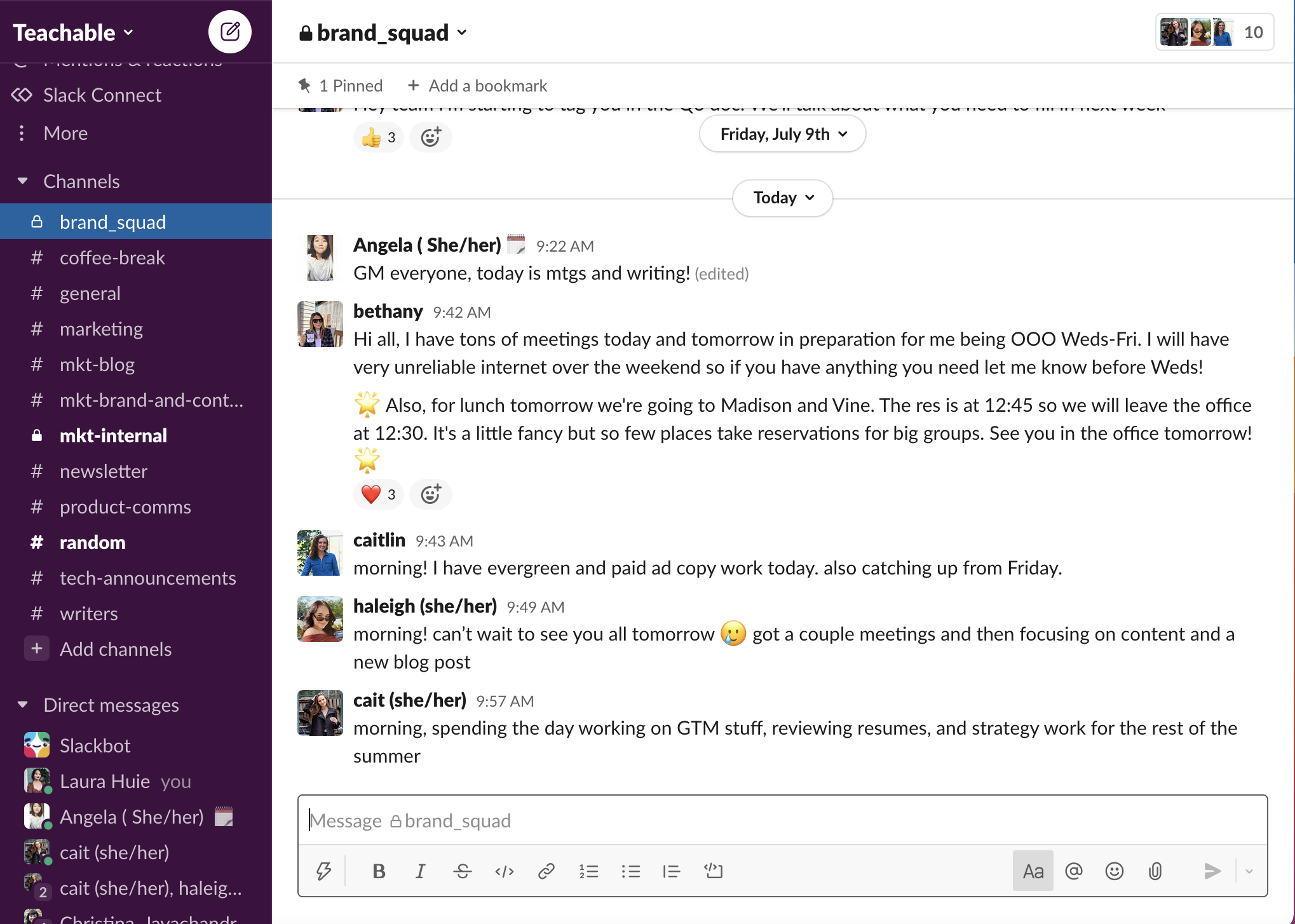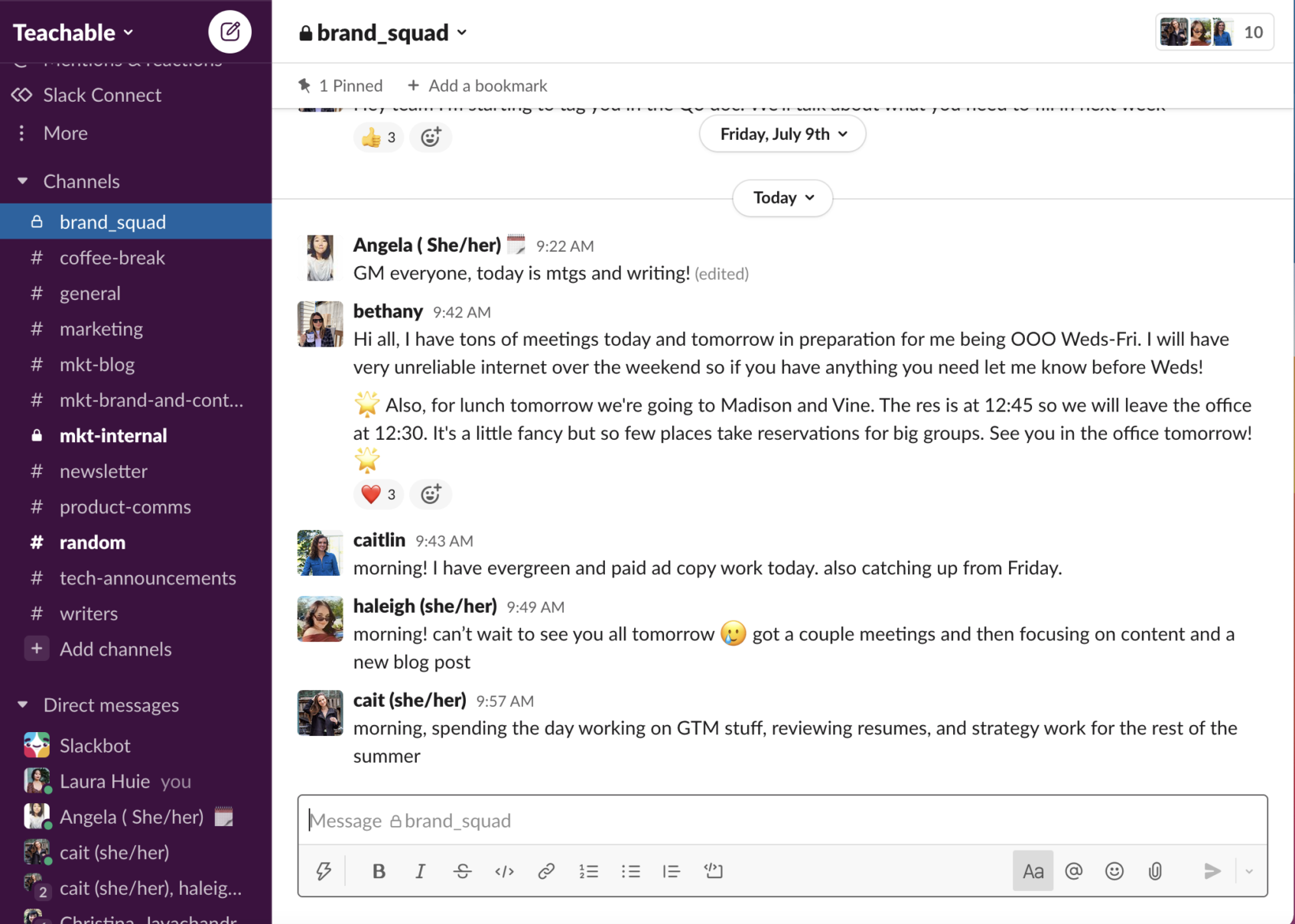Why Slack is the ultimate tool to build your online community


Slack is “a messaging app for teams.” It’s also the fastest growing business app ever (Fast Company). And we use it right here at Teachable. But at its core, Slack is a chat platform to connects teams, promote file sharing, and make info easily searchable. Creators can see the potential os Slack in terms of connecting with students: It’s a stellar app to use for building communities. If you’re interested in understanding the benefits of Slack communities, keep reading.
No slacking allowed
Rather than spend time crafting emails and sifting through old threads to find information you need to do real work, Slack works like an instant messaging board. There are “channels” on the left-hand side that categorize conversations by topic. And, everything is easily searchable within the search field. You can start direct messages with users, as well. Jessica Malnik gives a great overview if you want details. Here’s an example of what Slack looks like for Teachable:


What’s more, the instant messaging format of Slack is more casual, too. This saves time that you might spend checking grammar, formatting, and avoiding abbreviations in an email.
Not just an email replacement
But Slack doesn’t just replace a lengthy email. It works as a community forum whether you’re building a course, blog, or any other online product, too.
Nat Eliason and Justin Mares were set to make $48,000 in their first fully launched month with their Teachable course, Become a Technical Marketer. We knew they were doing something right, so we decided to chat with them to learn their secrets.
In their case, they added all of their enrolled students from Become a Technical Marketer to one Slack team. This included different discussion channels such as general chat, off-topic, technical marketing jobs, etc. This allowed all of the students in the class to speak with each other—and with Nat and Justin.
Why does this matter?
Remember: Community is important. As our social interactions shift online and more teams work remotely, we seek an online forum to feel connected. Besides internal use, businesses are using community to engage customers. This was detailed by BizReport:
-
49% report online communities help them save money on support operations
-
60% say their community helped to create a more engaging website
-
74% say communities drive organic search traffic
-
50% say they’ll use a community to up-sell customers
Why not Facebook?
While Facebook is widely known and most people already know how to use it, it’s not always the best community option. For starters, it takes a lot of bandwidth. A Facebook community can be slow-growing and doesn’t always have the features needed for an active community.
Especially for Nat and Justin, a Facebook group was an ineffective way to communicate. This was because Facebook groups:
-
Don’t work for people learning how to program since code formatting isn’t compatible with Facebook’s text editor
-
Don’t work when information needs to be easily searchable
-
Aren’t entirely customizable with multimedia content
-
Aren’t idea for live conversation
-
Have an incentive to include ads (that might show competitors) within your group
But, Slack allowed Nat and Justin to create a community that “was like no other out there.” They pitched this concept to students. If students buy the whole course package at once, they’ll gain access to this private community, which isn’t available with a single course purchase.
Slack communities offer…
1. Direct access to founders
This is a huge advantage. Specifically for courses, this one-on-one time is generally used to upsell customers to more premium packages.
2. Community conversation
Students are able to talk and build rapport with each other, for one thing. However, their dialogue also doubles as customer support. We asked Nat and Justin if they were constantly bombarded by requests for one-on-one time or if they were overwhelmed by requests. They weren’t.
As Nat took time early in the launch to troubleshoot issues with individuals. And, those he helped passed on their information to others asking the same questions. This has a two-fold benefit of solving customer support issues and strengthening the community bond within Slack.
“People have gotten really good about helping each other out and that’s great,” Nat said.
3. Job postings, additional hacks, and information
While this isn’t inherently an advantage to Slack, Slack easily facilitated the dissemination topical information. Compare this to Facebook where you’d have to scroll through old posts to find a job offer someone posted a week ago. With Slack, all the job offers are in one channel and are easily searchable.
Staying unique—and profitable
Nat described this community as no other out there. He was adding value to his course by providing easily accessible job offers, additional hacks, and direct access to himself and a new community using new technology.
We don’t want to extrapolate and say that a Slack community made Nat and Justin more money. But, it certainly provided advantages not seen in other community forums. It also seemed to help convince students purchasing one course to purchase two.
The value of community
Other brands have used Slack to monetize communities before. According to The Next Web, Startup Foundation created a Slack team, #startup, that includes 27 channels on relevant topics for founders to discuss. Trying to limit the number of half-interested users, or “wantrepreneurs” from joining a high-quality discussion, they started to charge a one-time $20 fee for entrance.
This fee has raised enough money that Startup Foundation could consider turning down investment money since they raised enough themselves. This highlights the importance of community and how it can be leveraged to earn money.
Pro-tip: Building your initial community on Slack involves a risk. If your product isn’t up to par, this forum provides the potential for users to feed off of each other. But view this forum as a way to get immediate product feedback.
Nat knew this and decided to go ahead with a Slack forum. Now, he checks discussion channels about twice a day and notes that his community has been great about answering their own questions and helping each other.
We have a 7 step list so you can discover your next profitable online course idea—for free.
